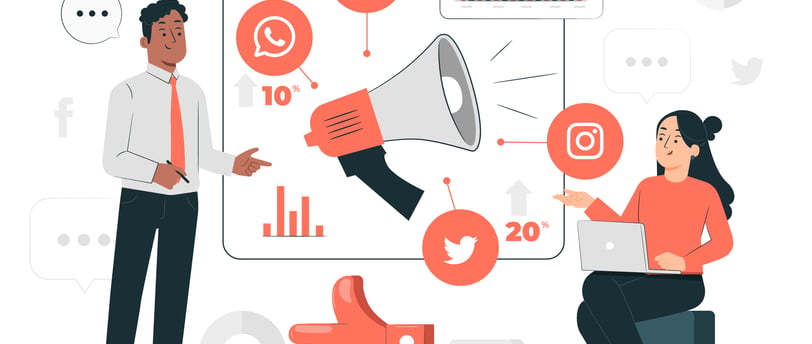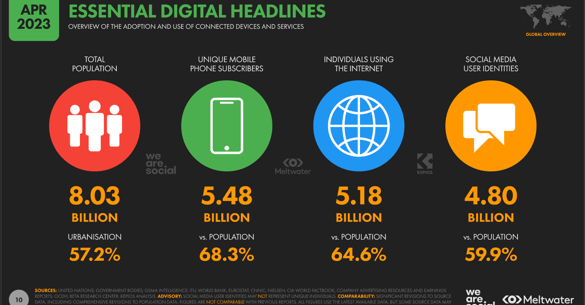What Is Digital Marketing?
A personalized explanation on what is Digital marketing
DIGITAL MARKETING 101


Digital marketing is the practice of promoting a good or service through digital channels such as websites, mobile apps, social media, email, and search engines. This broad phrase also refers to advertising on digital platforms like radio and television.
A couple of well know terms on Digital Marketing that you might know of.
Search Engine Optimisation (SEO) : Optimising a website for search engines like Google to increase its visibility and ranking.
Pay-per-click advertising (PPC): Advertising is the practice of purchasing the right to have adverts show up on social media or search engine results pages.
Content marketing: Content marketing is the process of producing and disseminating educational materials like blogs, e-books, and videos to draw in and keep a target audience.
Traditional offline media for advertising Utilising print, billboards, radio, television, live events, and other
Social Media Marketing: Social media marketing is the process of producing and disseminating content on Facebook, Twitter, Instagram, and other social media sites to raise engagement and brand awareness.
Digital ad spend worldwide will hit $601.84 billion this year, up 9.5% from $549.51 billion in 2022, according to forecast.
Digital marketing can be done both offline and online, and any comprehensive plan must combine the two. These methods and approaches assist companies in connecting with, engaging, and eventually converting their target audience into clients.
Before we dive into the specifics of this guide, let's talk about why digital marketing is so important for your company.
Why Digital Marketing Matters
Recalling the days of billboards? Absolutely.
My car rides in Mumbai were filled with the same chorus of familiar questions, like "Are we there yet, Mom?" interspersed with excited exclamations like "Hey, look, McDonald's! Can we pull over?" every time one of those imposing billboards appeared along the side of the road.
Growing up with Indian parents, the answer to both questions became a familiar refrain: "Not yet."
Imagine a lighthearted exchange between billboards that brings to mind the digital battles between Flipkart and Amazon, or maybe the current rivalry between Blinkit and Zomato. These imposing advertisements not only spiced up the city's visual scene but also made people laugh and argue over which internet behemoth was worth a trip. The battles between billboards shaped Mumbai's everyday story.
Not too long ago, my clients invested lakhs on billboard advertising. But things have changed in recent years.
Nowadays, the majority of businesses use digital or online marketing.
This is because Google and Facebook bring in more money than conventional media outlets.
The use of mobile devices comes next.
These days, you can go almost anywhere. One thing unites all of these establishments, whether it be a restaurant, grocery store, or even a movie theatre: a lot of people are virtually glued to their phones.
Mobile adverts are like tiny billboards; they play every time we search for something.
There is a massive increase in mobile usage, and the numbers continue to rise.


The statistics are unambiguous.
If you want to get your goods or services in front of consumers, you have to be present online where they are. Digital marketing is not an option.
Do not assume that digital marketing is solely the domain of large corporations.
Online marketing is beneficial for local businesses of all sizes. Google reports that 88% of users who use their smartphone to perform a local search go to a related store within the following week.
Not only that, but I haven't even covered all of the best aspects of digital marketing. It
Provides access to more data: You have access to crucial data regarding your clients' preferences and purchasing patterns. Utilizing this data, you can determine what works and what doesn't so that you can adjust your approach.
Helps in expanding your audience: Comparing digital marketing to traditional marketing techniques, you can reach a larger audience. Social media sites like Facebook and Twitter, for instance, have billions of active users, and you can target specific demographics with advertising. Social network users will number close to six billion by 2027. You therefore cannot disregard this platform.
Is economical: Compared to conventional marketing strategies like TV or print advertising, digital marketing is less expensive. You can accomplish your objectives and build highly targeted campaigns with digital marketing that will give your company a higher return on investment (ROI).
Increases engagement: Increased interaction with your target audience is possible with digital marketing. To maintain audience engagement and interest in your goods and services, you can use email, social media, and content marketing strategies. For example, adding a blog with insightful content to your website can draw visitors and increase the likelihood that they will make a purchase. HubSpot reports that 56% of readers of blog posts proceed to make a purchase.
Provides measurable results: You are able to monitor and evaluate the success of your campaigns with digital marketing. To assess the effectiveness of your campaigns, you can examine web traffic, conversion rates, and other metrics using tools like Ubersuggest and Google Analytics.
Helps your business stay competitive: In the current digital era, having a digital marketing strategy is crucial. You don't want to lag behind your rivals who are probably using digital marketing to reach their target audience. When compared to other digital marketing strategies, email marketing, for example, offers the highest return on investment.
These are but a few illustrations of the significance of digital marketing. You can increase your brand's awareness, interact with your target market, and boost sales for your company by integrating digital marketing strategies.
Overview of Online Digital Marketing
Online and offline are the two primary pillars of digital marketing. Having said that, I will discuss online marketing in a different guide, so for the sake of completeness, I will only cover the various aspects of online marketing here.
The following are the 8 main areas of online marketing:
Let's talk about these in detail in Upcoming Writeups..
Happy Weekend. :)
